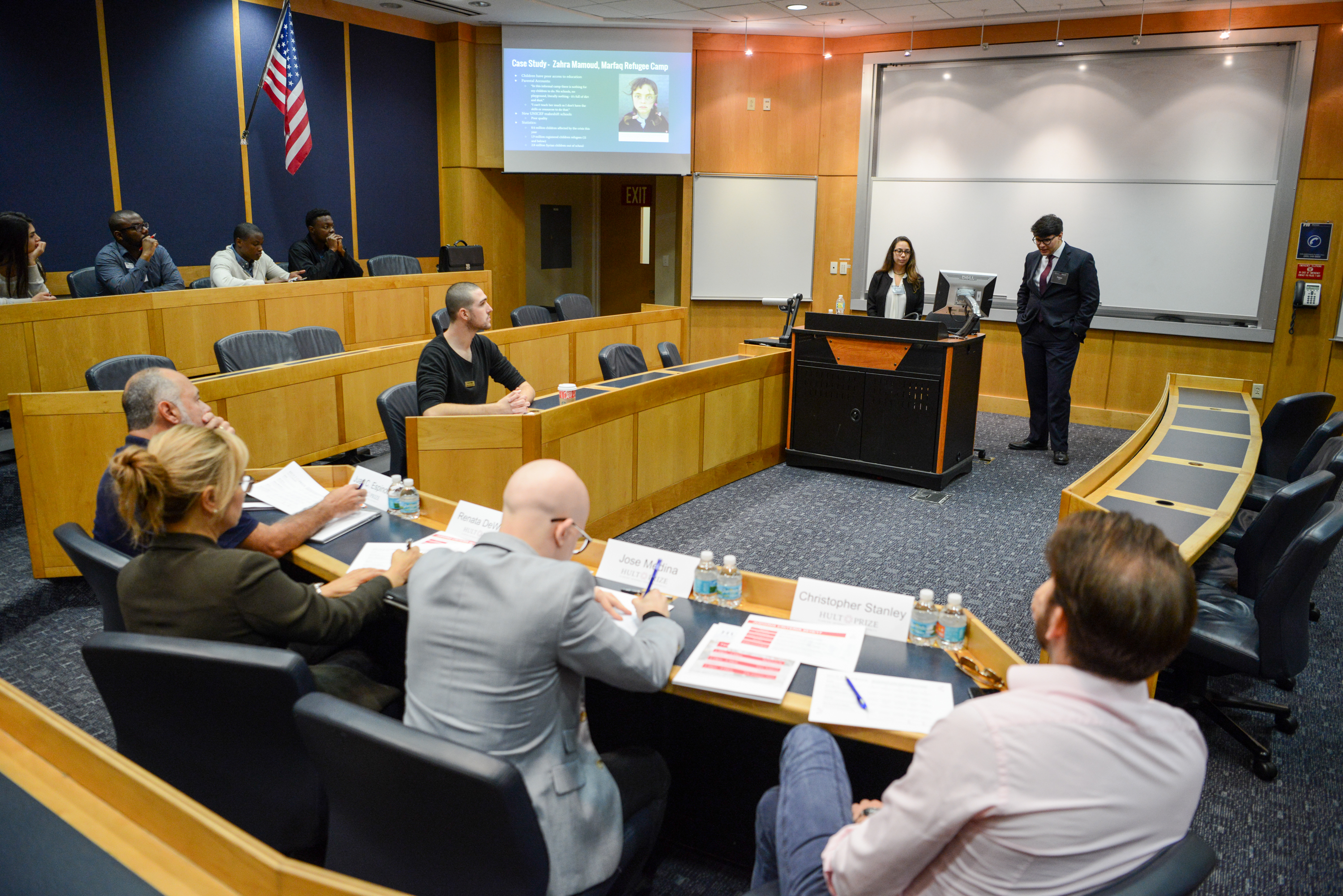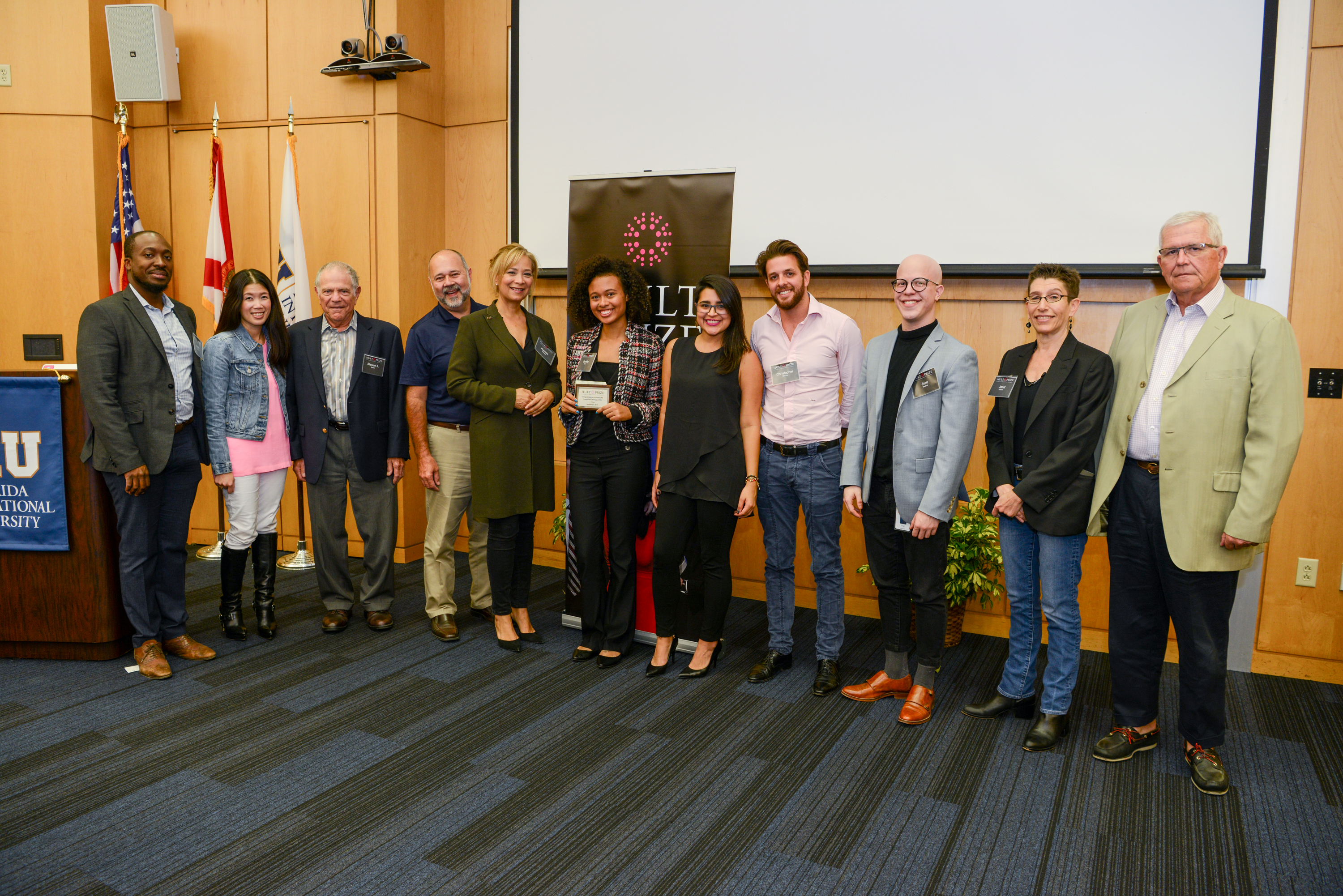Martina Bretous/Entertainment Director
When asked to find a sustainable and scalable social enterprise to help restore the rights and dignity of 10 million refugees by 2022, four University students created a buy-one-give-one business model for feminine products to help women in refugee settlement camps.
The Hult Prize Foundation is a not-for-profit organization dedicated to promoting social entrepreneurship. For the past seven years, they have hosted a nation-wide competition challenging graduate and undergraduate students to solve social issues through sustainable start-up enterprises.
Every year, the challenge changes and the winning team gets $1 million in funding to develop their project.
When Dorothy Peck, Isra Amin, Abeer Albarghouthi and Allicia Rolle found out about the Hult Prize competition taking place at the University, they each decided it was a great opportunity to participate.
“For me, I kind of knew about the Hult Prize for a little while now, maybe for three years. I’ve been following up on it … and when I found out that FIU itself was bringing the Hult prize here and we could actually participate as undergraduate college students, I just jumped at the opportunity,” said Amin. “And specifically for us, we really want to focus this on helping women, especially internationally, and it gave me an opportunity to feel like I can impact change.”
StartUP FIU, an initiative that fosters traditional and social entrepreneurship ventures in the community, sponsored the event.
“Because we have a relationship with the Hult Prize due to our founder, Bob Hacker, they proposed that if we do a competition on campus and we had 10 competing teams here, whoever won here would automatically make it to global regionals. So that’s what we set out to do,” said Daniela Cadena, social entrepreneurship coordinator at StartUP FIU.
In six weeks, StartUP FIU spread the word about the competition, recruited students and supplied them with the resources necessary to prepare for competition day on Dec. 9. Every Tuesday from the first meet up on Nov. 1 until competition day, teams met for small workshops and learned about problem solving, storytelling, research, financial models and pitching.
“We know the students have this interest and passion for … solving these huge world problems, but they sometimes don’t know where to start,” said Cadena. “All they need is a little bit of resources given to them to push them and making(sic) them believe that they can do it.”

After attending the first few meetings, Peck, Amin, Albarghouthi and Rolle formed a group and WeWomen was created – a name they found on a business name generator website. Together, they created a model, similar to TOMS shoes, where every purchase of a pad from their start-up provides one for a woman in need.
“When we were looking for problems refugees went through, sanitation was No. 1 … We found that a lot of women have problems managing their periods and it’s a very sensitive topic because in a lot of camps, they don’t have access to that,” said Amin.
With a goal of creating a product that would both help women and be environmentally friendly, what set their feminine products apart was the material: banana leaves.
“When we were researching, we discovered that there is a method that turns banana leaves into pads and so, economically, this is a lot cheaper than working with cotton,” said Peck. “And there are so many banana trees in … places where refugees camps are located so it’s less expensive, readily available and way better for the wearer’s skin.”
The team highlighted how undervalued feminine products are and how casually this problem is overlooked.
“It’s something that men don’t need so it’s not always seen as a necessity, on a full scale, but it’s just as important as having soap and other things that you need to stay clean,” Rolle
Albarghouthi added that many people questioned if there was a market for their product; the team had to emphasize not only the product’s efficiency but also its value in building up women and restoring their dignity, she said.
“When you don’t give women pads, you’re limiting their ability to go to school… to work and there’s also a ton of health risks because women are using garbage, soiled washed clothes,” said Peck. “So it’s about dignity, it’s about allowing women the opportunity to leave their homes because so many are just staying at home for a week every month so we really want to enable them to better their own lives.”
Every week, the team attended the workshops hosted by StartUP FIU, learning how to build a business model from mentors like Hacker and Cadena.
“She was super encouraging,” Peck said of Cadena. “She would hear our ideas and say ‘OK that’s really cool but you need to expand on it this way’… Just giving us guidance as far as presentation goes, as far as the business aspect goes, kind of telling us what to research online and telling us not to get too caught up in the little details.”
However, the team didn’t feel confident in their project until the hour before presenting. In addition to changing their entire marketing plan the night before, when the team sat at FIU’s Starbucks on competition day to go over their presentation, they realized the numbers section “doesn’t add up at all,” said Peck. After a few frantic moments, the team was able to fix the problem.
“Right up until our time slot, we were practicing our presentation and going over and over [everything.] And I’m having a terrible day because I just got my period, ironically, and it’s finals week, and I’m stressed and I have like five papers due… It was a lot but it was definitely worth it,” said Rolle.
Amin couldn’t be there on competition day because of another engagement, and Albarghouthi and Rolle had to leave after the presentation but when Peck found out their team had won, she immediately stepped out to call her group members and tell them the great news.

“It was a bit surprising. I thought there was better far off ideas but then I thought about it again and I thought it may be simple, ours, but simple was going to win,” Albarghouthi said. “Anything too far fetched wasn’t going to end up well in the long run.”
Cadena spoke of the team’s diversity and how well they complemented each other to create the winning model.
“It was four women from very diverse cultural backgrounds and they came together to solve this universal issue of women, which is menstruation hygiene, this under-talked about problem…,” she said. “They knew this was something that, across cultures, women have to encounter, young girls have to face. And it was interesting to see that they shared this value then also wanting to be eco-friendly.”
WeWomen will represent the University at the Boston regionals in March and will join StartUP FIU’s second cohort of teams in mid-January to prepare.
“I hope that even [when] we do get to Boston and [if] we’re still not able to make it, that we’re still interested in this idea and that we still gain support from the people who chose us as the winners and from Daniela,” said Amin.
StartUP FIU, open to University students, faculty and any resident of the South Florida community, is preparing a speaker series and hands-on workshops for the spring and will be opening a workspace in the Management and Research Center building. For more information, visit http://startup.fiu.edu/
Photo Credit: Ivan Santiago






Be the first to comment on "Hult Prize @ FIU winners to represent University at regionals for social entrepreneurship competition"